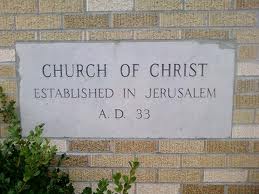“Every renewal of the church, every great age in its history, has been grounded on a renewed reading of history.” ~Justo Gonzalez
You know the familiar quotes and the wisdom behind them: Those who cannot learn from history are doomed to repeat it; Whoever wishes to foresee the future must consult the past; History cannot give us a program for the future, but it can give us a fuller understanding of ourselves so that we can better face the future.
We’re taking the advice to heart with our current Sunday morning adult Bible class series here at Central. Our curiculum is based on Gary Holloway and Doug Foster’s book “Renewing God’s People: A Concise History of Churches of Christ.” With this book as our guide, we’re considering our past, contemplating its relationship to Scripture, and having conversation about the paths ahead. The hope is that we can raise our “historical spiritual consciousness” by gaining a better understanding of how our faith and our churches have been shaped by inside and outside forces we may have never even considered.
In doing so, our aim is to collectively come to a better understanding of the vision and the call that resulted in the beginning of the American Restoration Movement, of which Churches of Christ are a part. They had a dream, right? There’s a reason Stone and Campbell and those founding fathers left their churches to begin our movement, right? Well, what in the world was it? What was so compelling that they left their own faith traditions and family stories?
Secondly, we want to see just where, why, and how we drifted so far away from that initial dream. What happened? What were the influences that got us off track? What role did culture play? History? The American Revolution? The Civil War?
Next, we need to determine if those original dreams and vision were right. Were those ideals on which our movement was founded faithful to the Gospel and to God’s mission for his Church? And, if so, how do we recover the best parts of those ideals for Central today? How do we reclaim the best parts of the Restoration heritage in our local context and setting, time and place?
We started yesterday by discussing the things that make the Churches of Christ different from the rest. What sets us apart? What makes us unique? The response from our class — a diverse group of people who range in age from late 20s to late 70s, some CofC lifers and a couple of people who were just baptized two months ago — was fairly typical. We ran down the list pretty fast: acappella worship, weekly communion, autonomous congregations led by a plurality of elders, believer’s baptism by full immersion, limited role for women, and a high regard for the authority of the Bible and personal knowledge of the Scriptures. After that came the slogans: Speak where the Bible speaks and be silent where the Bible is silent; We do Bible things in Bible ways and call Bible things by Bible names; etc., And then came a little honesty: Somebody mentioned that we’re perceived as thinking we’re the only ones going to heaven, and one of our brand new Christians confessed rather sheepishly that her mom had always told her the Church of Christ was a cult.
For the most part, these distinctives are dearly held by those of us in the Churches of Christ. For a lot of us, these are red flag issues. It’s emotional. Just mention a buzz word or a key phrase related to any one of these things around most of us and you’ll receive an impassioned plea touting the merits of such a practice or belief. Or a fight.
What we learn when we look at church history is that those things are not that unique to us. We didn’t come up with this stuff. It was all handed down to us by the Christians who went before. Martin Luther is the one who pushed for the authority of Scripture alone. John Calvin is the one who caused us to pay more attention to the sovereignty of God. The “anabaptists” of that same era were persecuted and mercilessly killed for their move to believer’s baptism by full immersion. John Knox and the Presbyterians pushed for the autonomy of local congregations led by a plurality of presbyters, or elders.
Any of that sound familiar?
Would it surprise you to learn that a whole mess of these faithful Christians came to America in the 18th century from Germany and Switzerland and Geneva and England and Scotland and brought their peculiar Christian beliefs and practices with them? And that Barton Stone and Alexander Campbell were among them?
We can find traces of us, Churches of Christ, in almost every strand of Christianity. They are our spiritual ancestors, too. They faithfully did the best with what they had at the time and diligently moved the Gospel story forward. We are not the first Christians. Or the only Christians. And we won’t be the last.
Our God is faithful; and very, very good.
Peace,
Allan

Leonard,
While you are doing this study, will there be any looking into the CoC’s role in race relations from the Civil War until present day?
Yes, of course. Now, honestly, this may be one area in which CofCs are right there with every other Christian denomination in the U.S. The most segregated hour of the week in this country is still 10:00 on Sunday mornings. And everybody’s to blame for it: all denominations, all colors and cultures.
Lord, come quickly!